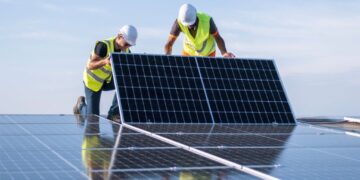What do you consider the safest path while economic growth is not stunted?
Decarbonisation will happen through Renewable energy. It is the best path to decarbonization.
We can also engage energy efficiency where appropriate. For Nigeria, you have to use less of fossil fuels as they produce much carbon.
As a producer, you have to look at the market and see if you can always sell your products, but your infrastructures should encourage the use of renewables especially for the electricity sector and other sectors like transport.
But I think the essential part is that you have to go to renewables, there is no other way!
Nigeria has declared the year as a year of gas. What role do you think gas will play?
Gas has the least CO2 emission and has been termed as the transition fuel. Gas will be used for sure in the coming decades until we go through the decarbonisation process. But it is very important that countries stop using coal especially when it comes to electricity generation.
The first thing to get rid of is coal because it produces a lot of CO2 and it’s being especially used in Europe and U.S with lots of coal stations.
But this is the first step in global decarbonisation-Get rid of coal.
Since the final goal in a certain decade depends on where development is for each country, it’s going to be renewables as I said earlier. But you have to be prepared for the next day even if you are using gas for the next decades.
You have to be prepared for the day in which you’d advance with decarbonisation.
You have to start building the infrastructures for renewables now if you want to achieve your target in the next decades.
Similarly, passing from coal should be to renewables and not from coal to gas, because that will mean you have to do it twice.
You have to start building this passage way now.
In doing so, you also get an idea of how to advance your infrastructures.
Importantly, for sub-Saharan Africa, electrification should be done with renewables.
This will mean that since a whole lot don’t have access to electricity, and you’d have to build something new.
The cheaper way even on market terms is through renewables today. You have the minigrids which are growing there. So the base should be renewables.
Energy access should be improved on with renewables.
For other parts, gas could be used as a transition fuel to going into the next decades.
REN21 as an organization champions the cause of renewable energy. So, since the inception of REN21, what are the policy changes that the organization has been able to effect?
REN21 is a policy network in reality; its main aim is to influence policy making towards renewables around the world. Looking at the structure of REN21 is what we call the multi-stakeholder structure and you don’t have any other one who has a global structure.
In Ren21, you have governments, you have international organization-All major organizations are members such as The World Bank , EU Commission, you have industry associations and major NGOs.
The structure is formed such that one has a level field of interaction between all major stakeholders. REN21 is 15 years and so in the last 15 years, we have really seen renewables expand in the world and has influenced a lot of nations towards renewables.
In the beginning of REN21, we worked a lot with China and China has seen a lot of change towards renewables in the past decade.
The influence is also helping to set up policies especially with Europe at the beginning and making suggestions to other parts of the world.
In each period, we put some countries as target countries. This starts with a political willingness.
When you see a political willingness them you go in that direction, if there is no political willingness, then you will not go anywhere.
The development of renewables in these last years, especially in terms of the costs has helped a lot. The cost of renewables has dropped drastically over the years.
I remember when I was in China at the beginning of REN21 and I was discussing with an official and they said this is for you rich countries, not for us.
This was the state of things at that time but not anymore.
At a certain moment, especially the 90’s, this was probably true but now anymore.
Countries like Germany have really invested a lot and helped bring the cost down. It’s not very to see but we are trying to see which countries we could help in that direction.
And for the next few years, Africa will be one of our main targets.
Africa is behind in terms of renewables but the potential is enormous and I think it’s a question of political willingness to move there. And I think Africa can be a good example in the use of renewables.
One thing I’d like to emphasize is the issue of awareness, which is key when it comes to renewables especially when it comes to Africa.
So, how do you think the media can come in and make sure that the energy transition is given more voice by the people that are in power?
I think the role of the media is very critical. Because like you said, you have to build the awareness in the population and also in the decision makers.
In that sense, the media pays a critical role in both. It may not be the same way in using the media to reach both categories but it has to be done and very critical.
Media must promote in the sense of putting out the realities of the renewables and putting forward the advantages that are there.
The role of the media, for me is extremely important. I also think the media should use all the modern channels.























